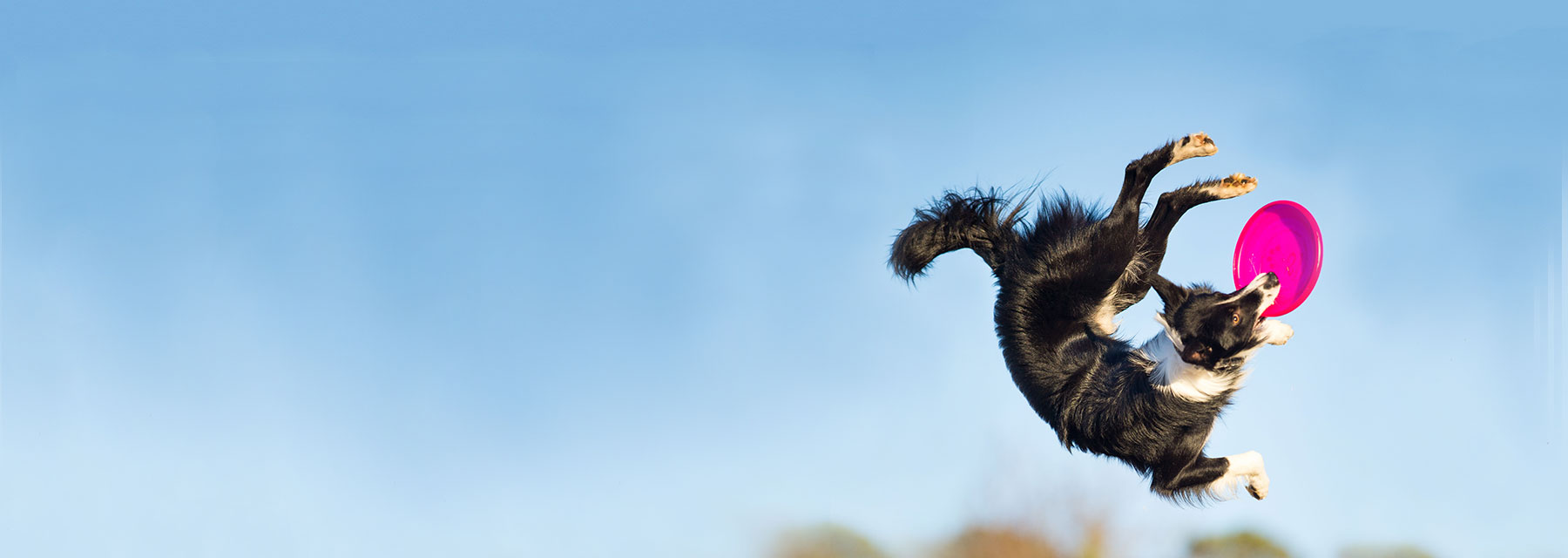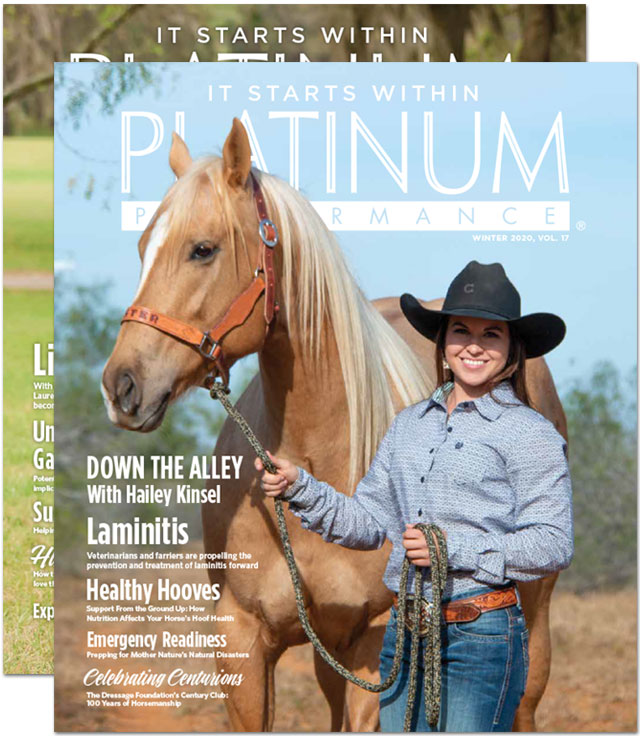Top Handlers of Canine Disc Share a Love For The Sport and For The Dogs That Make It All Possible
Is there anything more appealing to an active dog than spending time with their person outside, chasing down a plastic disc that is “running” away? At its most basic backyard level, a bad throw is still a good throw as disc dogs of every size, shape, color and breed are encouraged to, “Go get it!” and “Bring it back!” — and receive the ultimate reward: “Good dog.”
A simple round disc started a frenzy amongst dog owners everywhere in the 1970s. The sport of Dog Frisbee, or as many call it today, Canine Disc, began at the same time people were playing Frisbee at just about every park and beach in the country. It reached critical mass in August of 1974 in Los Angeles, California, when college student, Alex Stein and his dog, a Whippet named “Ashley,” jumped the railing in the middle of a Major League Baseball game to showcase their disc talents during the seventh inning stretch. For eight minutes, Alex and Ashley dazzled baseball fans in Dodger Stadium. As they were escorted off the field, the audience gave them a standing ovation, and a national television audience was able to see the pure enjoyment this new sport could offer. The unrehearsed display at the baseball game spiked immense interest in the sport, and Canine Disc took off — clubs started up, leagues were formed, National and World Championships were created. America’s Frisbee pastime became a competitive sport overnight and continues to gain popularity today.
Theresa Musi-Brantly and Autumn Trainor have both earned the coveted title of Canine Disc World Champion and have consistently been World Finalists with many of their dogs in multiple organizations. With ten dogs currently between them, these long-time friends and fellow competitors of over 25 years start each day feeding, grooming and cuddling their beloved pets. They are not only considered two of the best disc dog trainers in the world but as veterinary technicians, they have both dedicated their lives to animal health. Spending even a short time with Theresa and Autumn, it is soon apparent that their dogs are their lives, and the care and well-being of their animals always come first. Their dogs are specialized athletes and canine disc champions who have competed at the highest levels and performed at halftime shows in many National Football League and college football stadiums with their incredible skill sets. However, both professional disc trainers are quick to point out that they are also just “regular” dogs that require love and attention, discipline and training. The sport of canine disc is a celebration of the intense bond between dog and handler, and no one can attest to the strength of this bond more so than Theresa and Autumn.
“I love what the sport of Canine Disc can do. I love the fact that you can pick up a relatively cheap piece of plastic and play in your backyard and interact with your kids and dogs. It gives people a way to have a bond they wouldn’t necessarily have otherwise.”
— Theresa Musi-Brantly, Canine Disc World Champion
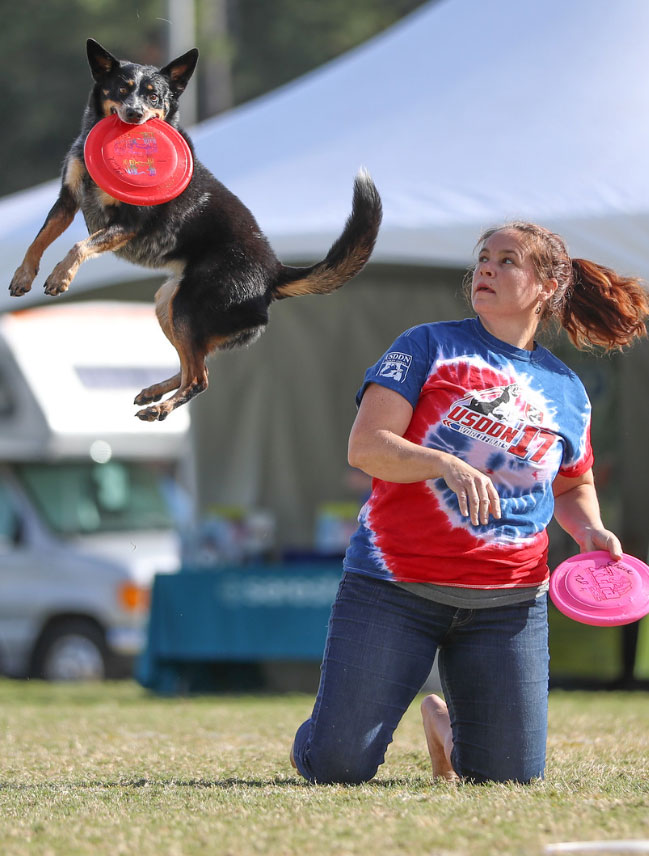
PHOTO BY WAYNE RAMSAY
Canine Disc Events
Different organizations offer a variety of classes to compete in, but these three events are most commonly found at disc competitions: Toss and Fetch, Freestyle and Long Distance.
• Toss and Fetch: Also called Throw and Catch or Distance/Accuracy, this is an event that many people start with when being introduced to canine disc. It is a short distance event that has a set time limit — usually about 60 seconds — to throw a disc as many times as possible with increasingly longer distances, averaging about 40 yards. Using a single disc, full retrieval is required before the next throw is launched. Dogs can earn extra points for catching the disc while completely airborne.
• Freestyle: A fan favorite event as it showcases the incredible athleticism and acrobatics of participating canines. Pre-choreographed routines set to music range in length from 90 seconds to 2 minutes and include dogs vaulting and twisting in the air, jumping off handler’s bodies and weaving between handler’s legs. This event is subjectively judged on difficulty, creativity, showmanship, discipline and a “wow factor.” Freestyle routines have increased dramatically in degree of difficulty over the years to the amazement of crowds and are popular demonstrations at public exhibitions. Champion Freestylists are often considered to have achieved the highest level of competitive disc accomplishments.
• Long Distance: Rarer to see but equally as spectacular, the Long Distance event features an elimination-style competition that pits teams against each other, with the winning teams successfully throwing the longest distances. Men and women compete together in disc dog disciplines but are sometimes divided into separate classes for Long Distance. Women have clocked in at over 65 yards in Long Distance throws, and men are competitive around 70 to 80 yards. Successful throws of over 90 yards have even been recorded. The Quadruped is an organization that offers stand-alone distance competition for long distance lovers.
Welcome to the World of Canine Disc
One of the best parts about canine disc is that anyone can truly enjoy it if you have an interested dog, a flying disc and a little bit of a throwing arm. It is estimated that over a million dogs in the United States alone play flying disc, although a small percentage actually compete. Not everyone who plays disc chooses to compete but may prefer just to practice and simply spend time with their dogs. “The best part about disc is that anybody who has a dog can do it,” Theresa notes. “I love to do it. I love to judge it. I love to share it.” Like every sport, canine disc is easy to start and difficult to perfect. Rising to the top level of competition takes incredible training along with natural talent and athleticism of the animal. The original disc dog from the famous MLB game, Ashley Whippet, could run 35 miles per hour, jump 9 feet in the air and could catch the disc mid-air complete with 360-degree aerial acrobatics.
For competitors at heart, there are several official organizations for the sport, along with local and regional clubs in many areas across the country and abroad in Canada, Europe, Asia and Australia. Disc dog competitions are flourishing with popularity so widespread that there are good chances something is offered a reasonable drive from most hometowns. There are at least five canine competition series that offer multiple national and international competitions with a variety of competitive formats including the Ashley Whippet® Invitational (AWI), Skyhoundz, the United States Disc Dog Nationals (USDDN), UFO, the Flying Disc Dog Open (FDDO) and others. The different organizations offer a variety of classes to compete in, but these three events are most commonly found at disc competitions qualifying for National or World Championships: Toss and Fetch, Freestyle and Long Distance.
“Nutrition is the foundation of the disc dog sport. If they don't have the right nutrition, their bodies can't do what I have to ask them to do.”
— Theresa Musi-Brantly, Canine Disc World Champion
Theresa Musi-Brantly's Crew
Zen “The Zen Master”
11-year-old Australian Shepherd
A world finalist in Dock Diving and a 3-time K9 Disc World Champion. He is a hardworking, loyal partner who will do anything for his people. At 10, Zen ruptured his ACL and tore his meniscus. Zen not only recovered but was stronger than before surgery. Running faster and jumping farther. He still plays frisbee almost daily and performs as often as possible.
Dallas
11-year-old Mini Australian Shepherd
He is a multiple-time World Finalist in the sport of K9 Disc and a K9 Disc Micro Dog World Champion. He was part of a hoarding case with 98 other dogs. Shortly after adopting him, Theresa realized he was a born showman. He loves life and all of its adventures. He has been competing and performing for most of his life. At 11, he still has the best endurance of the crew.
Twitch
7-year-old Border Collie
Multiple-time K9 Disc World Finalist with several podium spots including Reserve World Champion in 2018. Twitch is handsome, obedient and incredibly athletic. He is one of the sweetest dogs you will ever meet. He has been a great partner and never fails to amaze.
Stat
6-year-old Belgian Malinois
She is a world class dock diver and multiple-time K9 Disc World Finalist. This hard-working girl came to Theresa through rescue very anxious and very malnourished. Through a lot of patience and great nutrition, she is now a confident athlete. She even shows her silly side occasionally.
Amari
1.5-year-old Australian Shepherd/Australian Cattle Dog/Border Collie
She is a comedian. Always busy and willing to do anything for a reaction. She also has a serious side and is training to be a service dog. At less than a year old, she qualified for the K9 Disc World Championships. She has an amazing career ahead of her.
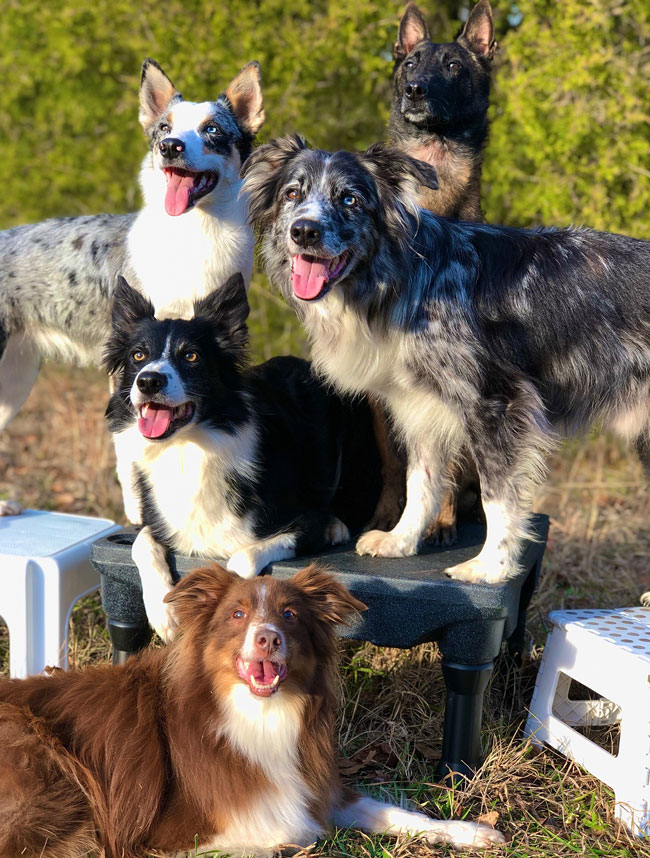
From the top down: Stat, Amari, Zen, Twitch and Dallas.
COURTESY PHOTO
A Champion Worth Waiting For
Theresa Musi-Brantly started her remarkable career with a very simple beginning. “A friend recommended I go to an event in Cartersville, Georgia, by simply saying, ‘You should go. Your dog plays Frisbee.’ ” Theresa thought it sounded fun, and so she went. The event turned out to be the Georgia State Championships. Theresa watched in amazement at the speed and agility of the dogs competing, as well as the obvious practice and training it took on the handlers’ part. The entire event consisted of high-flying dogs with palpable enthusiasm and electricity between the dog-human team. “I saw what these people were doing, and my mind was completely blown,” she explains. Theresa left that event with a new goal in mind — to enter a canine disc competition.
Theresa’s first competitive dog was “Krissy,” a Baussie (Border Collie/Australian Shepherd cross) blessed with innate athleticism and an inherent understanding of the sport. “I watched Krissy become more outgoing every single day. She took me to regionals, where I placed in the top eight. I certainly didn’t expect to be good enough to place at the regional. The first time I did, I can just remember being in awe of her.” Krissy inspired Theresa to continue working on and developing her own canine disc abilities, which she would later rely upon.
Most dogs that are introduced to disc games take some time to understand the idea and do not just immediately start chasing down and leaping after discs. And then some dogs just get it. Theresa has witnessed many standout dogs in her career, whether training her own or seeing others in competition. One special dog stood above the rest to her personally and in the eyes of the sport: an Australian Shepherd rescue named “Trixie.” Trixie did not have an easy life up to the point when Theresa adopted her at six months old, or as Theresa puts it, “We adopted each other.” Trixie had lived in three different homes before she came to Theresa’s, and building trust was a challenge. “The only way I got through to her was training, constantly training. You give me this, and I’ll give you that,” she says. To build trust, Theresa used an approach similar to the one she used with Krissy, leveraging the repetition and challenge of disc training to forge their relationship. “I used that Frisbee. We trained together, and she would learn things that challenged her and would get so excited when she figured it out.” Theresa knew that all the time spent training was forming a bond and turning into much-needed trust.
Breaking through to Trixie was its own challenge, but training one of the most athletic dogs the sport had ever seen was an entirely different endeavor. “She was a force. I had no idea what to do with a dog that athletic. Any trick you could think of, she could do it — and then she’d add her own spin to it.” Some of Theresa’s best tricks as a handler, many that had never been done before, were invented due to Trixie’s incredible raw talent. Her speed, hangtime and ability to turn on a dime put her in a class of her own. Watching her organic, natural movements and seeing what she was capable of made the sky — literally — the limit for Trixie. One of her signature tricks included jumping up to catch one disc as Theresa threw a second disc while she was in the air; Trixie would catch both discs at the peak of the jump. “It’s really rare to come up with something that’s never been done. She made me want to be a better handler,” says Theresa.
After one of her early competitions with Trixie, one of the judges (now a close friend), pulled Theresa aside and said, “You have a very athletic dog. You’re not. Fake it or get better.” She was admittedly mad and insulted when she heard this but also took it as a brass tacks bit of advice and a challenge. “I trained with Trixie, but I also started training myself. I threw over 100 discs six days a week. I started working out with a personal trainer and improved my nutrition,” she says. Two years of hard work later, Theresa and Trixie qualified for the 2000 IDDHA World Championships and, in front of that same judge, won first place and the overall World Champion title. “Trixie was a two-time World Champion and multiple-time Reserve Champion, including winning dozens of local events. She went undefeated for almost two years straight. She gave me a name in the sport,” Theresa says tenderly.
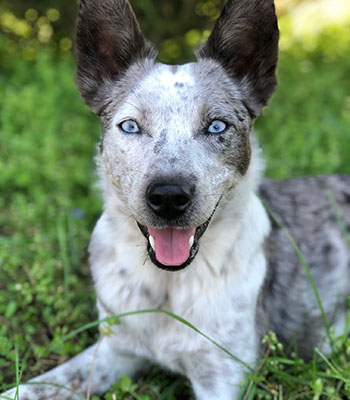
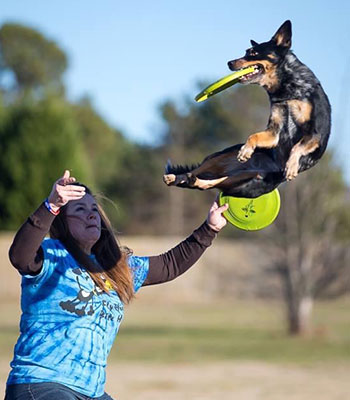
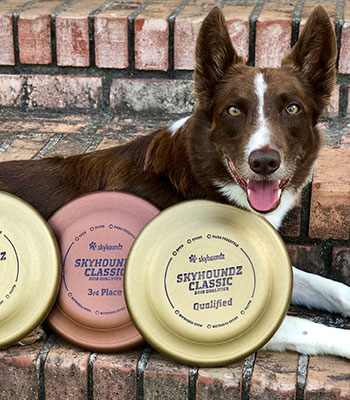
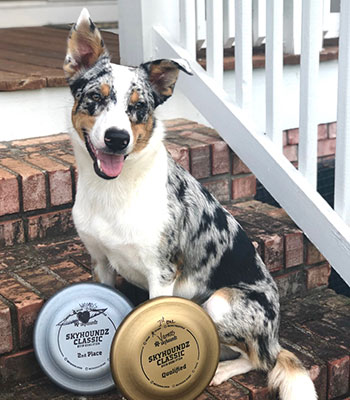
Autumn Trainor's Crew
A Platinum Performance® client since 2004, Autumn uses Platinum Performance® Canine PLUS for her four dogs.
Mystique
3-year-old Australian Cattle Dog/Border Collie
Mystique joined the team at 4 months. She was nervous and anxious from the start. Through the sport of K9 disc, she is becoming a sweet, confident and outgoing companion. Her speed and hops make her an incredible athlete.
Karizma
10-year-old Australian Cattle Dog/Australian Kelpie
A multi-time K9 Disc World Finalist, she is the matriarch of the team. She has an independent and exuberant personality. She is an amazing athlete and a true foodie. Together through the sport of K9 disc, the duo has learned about trust and partnership. At 10, she is showing no signs of slowing down.
Tate
7-year-old Border Collie
Multi-time K9 Disc World Finalist. Tate is a hard-working loving boy. He loves all people small and tall. His accuracy and tracking make him a perfect disc partner.
Vamos
1.5-year-old Australian Shepherd/Australian Cattle Dog/Border Collie
This handsome boy isn’t just a pretty face. His patience, zest for learning and desire to please led him to the K9 Disc World Championship at just under a year. His future is bright, and Autumn can’t wait to take the journey with him.
Close Friends and Stiff Competitors
From a young age, Autumn Trainor developed a strong affinity for animals that never left her, even in adulthood. In her second year of veterinary technician school, Autumn rescued “Nevi,” a Border Collie. She started throwing her Frisbees, then saw a video of dogs playing Frisbee and was intrigued by how much fun it looked to be for dog and person. Autumn began searching for more information on the sport and found a set of training videos titled, How to Train Dogs to be Frisbee Dogs. She ordered the videos and watched them intently recalling that an instructor named Theresa and her dog, Trixie, were featured in the videos.
Autumn practiced with Nevi whenever possible. In 2000, she went to her first Frisbee competition with her self-taught, nine-month-old Border Collie. In one of her first major competitions, Autumn received the “Crowd Pleaser Award,” an award given to a young team as encouragement. “It’s meant to communicate, ‘You’re on the right track. You’re not quite there yet, but we recognize your talent,’ ” she says. After receiving this award, Autumn sought advice from a fellow competitor (Theresa) at the event and asked her, “How do I never get this award again?” Theresa laughed because most people felt the award was a pat on the back, but, for Autumn, it was a slight. Theresa gave her her own scoresheet from the judge, and they went over how Autumn could improve her score. The next time Theresa saw Autumn was at a regional competition where they were both competitors. Autumn and Nevi won decisively. In Theresa’s words, “She kicked my butt, and then went for the World Championship.” That year, Autumn and Nevi earned their first World qualifying spot, and four short years later, they were back winning the 2004 USDDN World Championship title.
Theresa and Autumn have trained side by side for many years, and they continue to learn from each other, a critical tool for both of them. “Being able to train with someone that does the same sport as you is invaluable,” says Autumn. “Sometimes you hit roadblocks, and she’s right there to suggest a different approach or to offer support.” Both women have similar philosophies in training. They treat each dog as individuals and are careful to ensure that their dogs are trained appropriately for their age, ability and personality. “One of my philosophies when I’m training is just to make sure that each dog reaches their maximum potential,” says Theresa. Autumn continues on the same ideology. “As trainers, part of the bond and the relationship building is learning what motivates each dog to perform. Once you find that, they give you 100 percent.”
The relationship between these professionals is built on extreme respect for one another. To be clear, they are both very competitive and want to win. “We are hard-core competitors,” says Theresa. “I want her to do her absolute best because if I beat her, I want to beat her at her best. And Autumn feels the same way.” Autumn continues as if of one mind, “We’ve shared the podium, her in first, me in second and vice versa so many times I couldn’t even tell you. Our favorite moments are when we share the podium together.” They are each other’s greatest supporter and cheerleader. Their special relationship led them to start a company together called K9 Hangtime. Their dogs have performed at halftime shows for the NFL and college football, and at fairs and festivals all over the country. Their schedule is fast paced and traveling with dogs has its challenges, but both still love all of it. “I love the training, the goal setting and I love the performance side of it. I love taking music that fits me and that dog and turning it into something special,” says Theresa. “I love what the sport of Canine Disc can do. I love the fact that you can pick up a relatively cheap piece of plastic and play in your backyard and interact with your kids and dogs, or just bring a smile to somebody’s face. It gives people a way to have a bond they wouldn’t necessarily have otherwise. That part of it is just so much fun.”

Autumn Trainor is a self-taught World Champion Canine Disc handler.
PHOTO BY WAYNE RAMSAY PHOTOGRAPHY
Nutrition and The Canine Athlete
Training these elite canine athletes consists of four to five days a week with the disc combined with two days a week of cross training and conditioning. Disc techniques include catching, tracking and building the freestyle routine with tricks and vaults. Strength and conditioning focus on targeted exercises to build muscle and coordination. Most of the training is done individually, which allows the ability to focus on each dog’s strengths and weaknesses, although sometimes they are trained together to teach patience and increase drive. Of no less significance is the sector of training that encourages them to simply “be a dog” through hiking, swimming and playing with the rest of the pack. This type of free play and plenty of down time keeps the dogs mentally fresh. Health and injury prevention is of utmost importance with these extreme athletes and includes routine veterinary appointments as well as regular chiropractic, acupuncture and massage sessions and a big emphasis on nutrition.
Both trainers know that what their dogs eat on a daily basis makes a difference. Making sure the nutritional needs of each individual dog are met and balanced is extremely important. “Nutrition is the foundation of the disc dog sport,” says Theresa. “If they don’t have the right nutrition, their bodies can’t do what I have to ask them to do. If they don’t have the right nutrition, their mind can’t do what it needs to do. Think about those days when you’re too busy to eat lunch, how productive are you at 3 o’clock in the afternoon?” She continues, “I need them to be strong mentally and physically. I feel like Platinum delivers on that across the board. All of the dogs in this house are on CJ every day, and that alone is enough for most dogs.” Her dog, Dallas, has a condition called Border Collie Collapse (BCC) syndrome. “Basically, it’s a form of a seizure that doesn’t respond to seizure medication, and it’s exercise induced. He will literally pass out. Without Platinum and without Platinum’s DHA oil, he wouldn’t be the dog he is, and he certainly wouldn’t be the World Champion that he is.” Theresa concludes, “It doesn’t matter what the problem has been over the years, Platinum has had something that can help me nutritionally to add to whatever was going on. I certainly wouldn’t be as successful in my Frisbee career without Platinum.”
Autumn has similar sentiments regarding the significant impact nutrition has on her dogs’ general health and athleticism, specifically. “Nutrition is so important, and I have been using Platinum Performance since 2004 on all my dogs. With puppies, as soon as they are able to start on it, it becomes part of their diet. Nutrition plays a big role, and I would definitely say Platinum Performance is a big part of that. These dogs are crazy good athletes, and they should be treated with only the top-of-the-line nutrition,” she says.
As athletes, the dogs require some special attention to details for athletic preparedness, muscle recovery and joint support. They are highly-trained specialists in an awesome sport. But first and foremost, they are companions for both Theresa and Autumn. They require love, attention and understanding. Simply spending time is the most important thing for training any dog, and a competitive disc dog is no exception. Both professionals agree that these dogs are not robots, they have feelings and are treated like any beloved pet. Autumn captures this sentiment best: “Just spending time with a dog will change your life.” Together, Theresa and Autumn currently have four Amateur dogs and six World Finalists that benefit immensely from all the lessons the previous champions have taught them. The now-renowned trainers eagerly await seeing just how high the next generation will fly.
Theresa Musi-Brantly's Titles
- 2000 International Disc Dog Handlers Association (IDDHA) World Champion (Trixie)
- 2001 IDDHA Reserve Champion (Trixie)
- 2003 IDDHA World Champion (Trixie)
- 2011 Extreme Distance Micro Dog World Champion, Women’s Division (Dallas, trained by Theresa)
- 2011 Extreme Distance Unlimited Plastic, Men’s Division (Zen, trained by Theresa)
- 2011 DiscDogathon (DDAT) Pairs Distance and Accuracy World Champion (Zen, trained by Theresa)
- 2012 DiscDogathon Freestyle World Champion (Zen, trained by Theresa)
Autumn Trainor's Titles
- 2004 USDDN World Champion (Nevi)
- 2005 Bronze Medal in the ESPN Great Outdoor Games “Hotzone” — only female handler (Nevi)
- Multiple Time Skyhoundz World Finalist (All Current Dogs)
- Multiple Time USDDN World Finalist (Karizma and Tate)
- World Finalist for Skyhoundz and USDDN Every Consecutive Year from 2012 to present
